Hello Steemians,
It's another time where I bring medical information to you all. Today, I'll be talking to you about a condition that affects the dentition of children (babies actually) but gets pronounced or noticeable in their adult life.
I decided to choose this topic because I had a patient walk into my clinic facility last Friday and he presented with it.
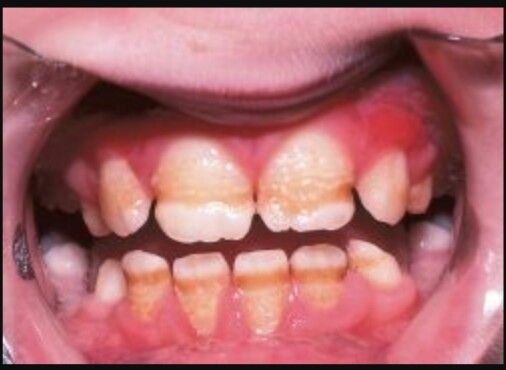
Source
DEFINITION
Chronological Enamel Hypoplasia is said to be the defective formation of tooth structure (usually in the first layer of the tooth called the Enamel) which results to an incomplete organic matrix formation of the teeth.
It tends to occur when there's an injury or assault during the time the teeth were developing, which is either the embryonic stage or the formative stage of enamel formation.
In many cases, such assaults are severe systemic events that occur during the development of teeth from 3 months in Utero (before birth) to 20 years.
Different teeth (that is the types of dentition) will show defects at different levels depending on the stage of the crown formation at the time the disturbance occurred leading to a defective reduction in both quantity and quality of the teeth structure.
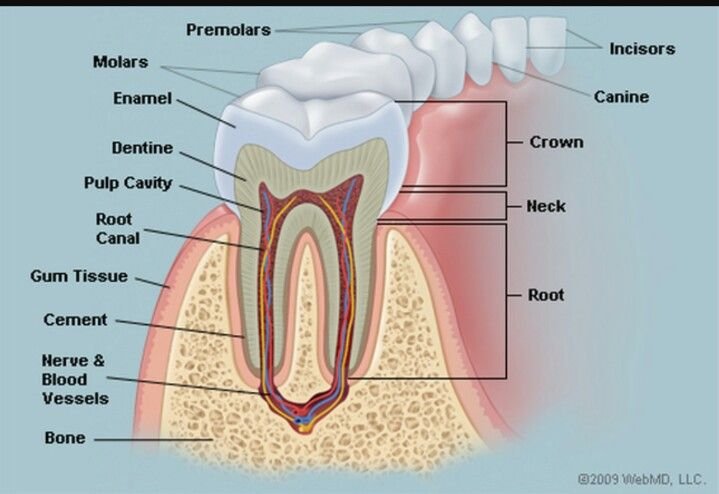
Source
TYPES
1) Hereditary type: This affects both the deciduous (milk dentition) as well as the permanent teeth. Most times, only the enamel layer which is the first layer of the tooth structure is affected and it's usually generalised.
What that means is that it's found to be affecting all 20 teeth in the deciduous dentition or 32 in the permanent dentition. This type of Chronological Enamel Hypoplasia occurs during the embryonic stage of enamel development.
2) Non-Hereditary/Environmental Type: This condition results from some environmental factors that affects either the primary (deciduous) or permanent dentition.
Most times only a single tooth or a number of teeth is affected. It also tends to affect not only the enamel layer but also includes the dentine layer as well. It occurs during the formative stage of enamel formation.
CAUSES/FACTORS ASSOCIATED
A) With Localised Distribution
- Acute Osteomylitis
- Acute trauma of primary teeth
- Ankylosis
- Cleft lip and palate
- Congenital Syphylis
- Electrical burns to mouth
- Irradiation
*Periapical Infection of primary. teeth
B) With Generalised Distribution
Prenatal Causes(before birth)
- Aneamia
- Cardiac disease
- Congenital allergies
- Cytomegalovirus
- Diabetes
- Excess Fluoride ingestion
- Hypoxia
- Malnutrition
- Pregnancy Toxemia
- Renal Disease
- Rubella
- Severe Stress
- Urinary Tract infection
- Vitamin A Deficiency
- Vitamin C Deficiency(Scurvy)
Perinatal Causes (few weeks before birth or during birth)
- Bile duct defect
- Breech presentation
- Caesarean Section
- Erythroblastosis fetalis
- Hemolytic disorders
- Low Birth weight
- Neonatal Exphexia
- Placenta Previa
- Respiratory Distress Syndrome
- Traumatic birth injury.
Postnatal Causes (first 2weeks after birth)
- Chicken Pox
- Cholera
- Cytotoxic drugs
- Diphtheria
- Fluoride
- Gastrointestinal Disturbance
- Measles
- Meningitis
- Nephrotic Syndrome
- Otitis Media
- Small Pox
- Tetracycline staining
- Tuberculosis
- Vitamin D intoxication
FEATURES/PRESENTATION
For mild features, presence of single groove on enamel surface of anterior teeth, few pits and fissures on occlusal (chewing) surfaces of posterior teeth.
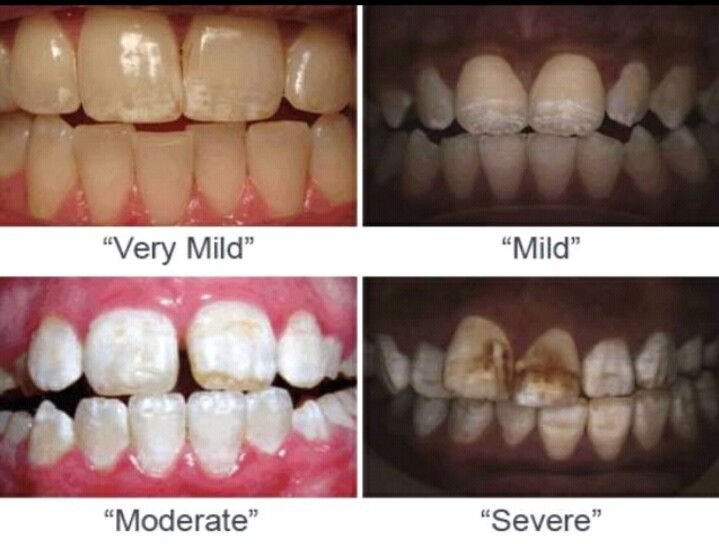
SourceFor moderate features, presence of more than one groove and pitting on enamel of anterior teeth. Also more pits and fissures of posterior teeth. Example is Mulberry molars seen in Syphilis which affects the posterior teeth such as the molars, also the Hutchinson's Incisors affects only the anterior teeth.
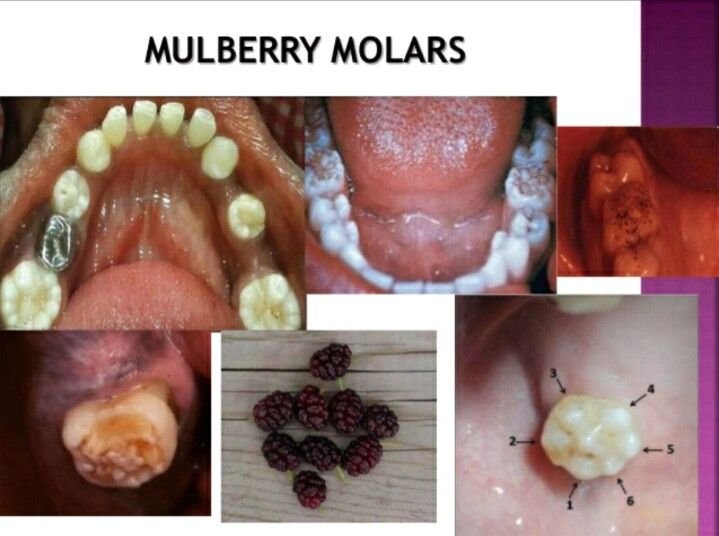
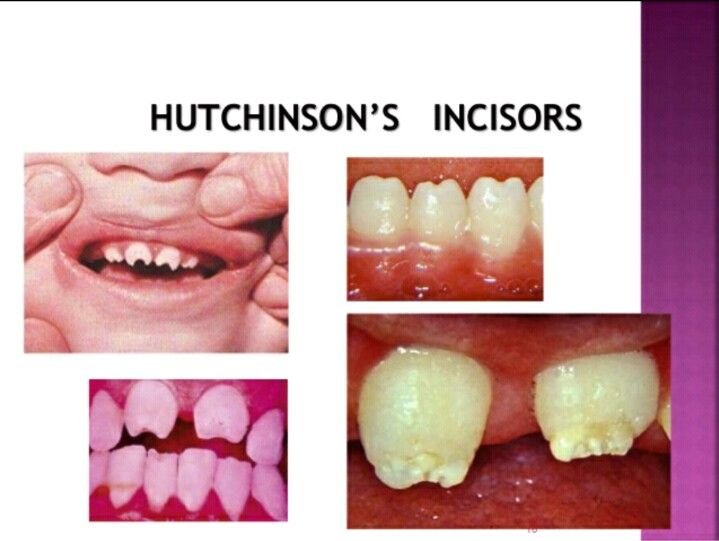
Source
3)For severe features, there is most times absence of enamel layer, presence of brownish tint or stain or discoloration of dentine surface, severe sensitivity due to absence of enamel surface. Also presence of increased risk of caries.
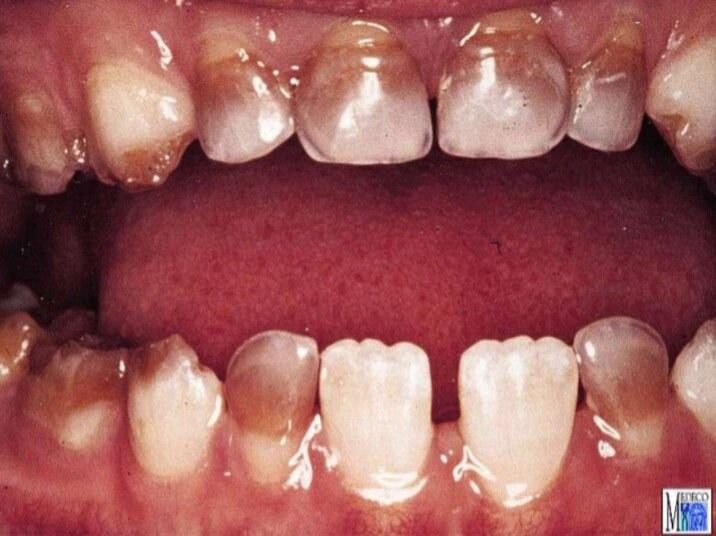
Due to Tetracycline intake
Source
TREATMENT
In most cases of Chronological Enamel Hypoplasia, treatment is usually indicated for aesthetic needs.
However, in severe cases where there's the presence of hypersensitivity of the teeth and the presence of increased susceptibility to caries, the need for treatment goes beyond aesthetics but will also be for the comfort of the patient, as well as to prevent further dental tissue damage.
For single tooth defects, we use tooth coloured filling materials which are placed over the defect having the same colour of patients enamel to mask the defect. Examples are Composite light cured material, Amalgomer, Dentine Bonding materials.
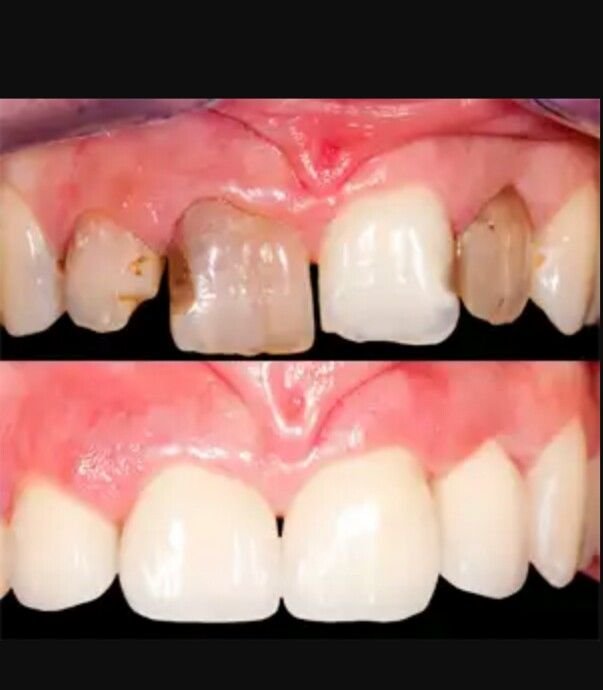
Before and After dental material placementFor more extensive or generalised cases and also for preventing caries formation and managing sensitivity of exposed dentine, the use of crowns, dental bridges, inlays or veneers are preferable used and are placed over the affected teeth after a good crown preparation.
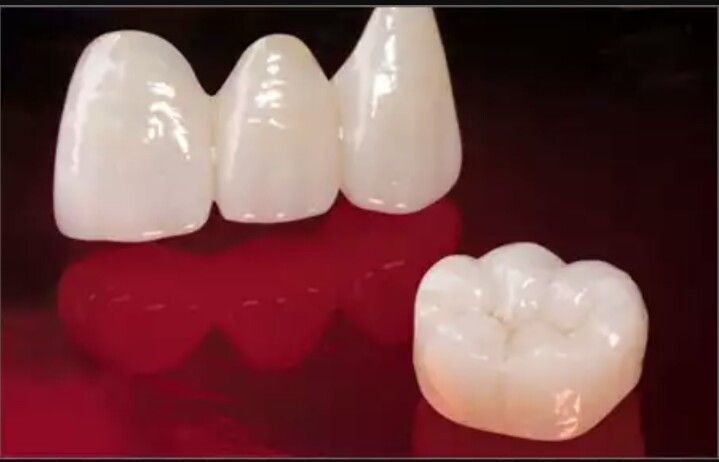
Crown and Bridge
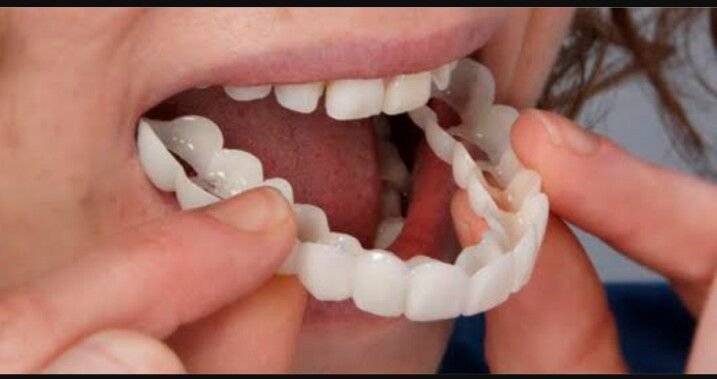
Veneers
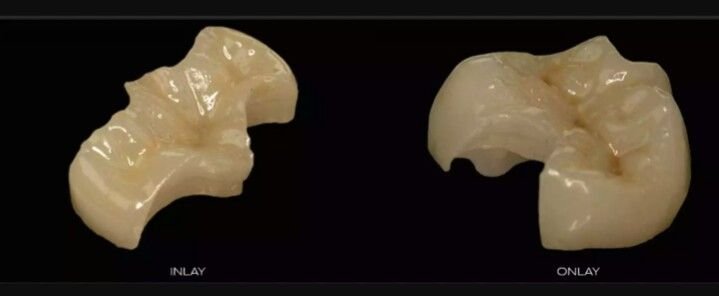
Dental Onlays and Inlays
Source
CONCLUSION
Enamel Hypoplasia may seem as no big issue but it has been found to be the cause of many people's low self esteem and poor confidence level.
You don't have to leave your dentition that way, get treated and have that awesome smile you have always wanted.
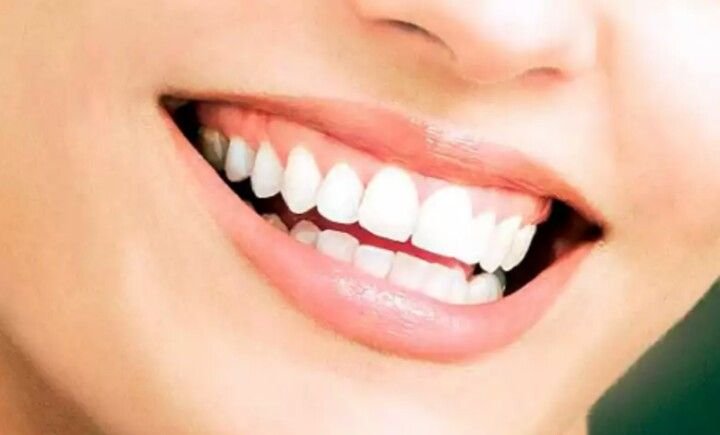
Source
Till I come your way with more Dental Health information, I remain @thelovejunkie.


 Yet to join first Steemit Hospital/Clinic @air-clinic, what are you waiting for?
Click on https://discord.gg/rqded5m
Yet to join first Steemit Hospital/Clinic @air-clinic, what are you waiting for?
Click on https://discord.gg/rqded5m
Thank you for sharing this. Very profound and insightful.
Thanks for visiting brovur @optimistdehinde. I'd appreciate if you can resteem it. Thanks
Nice one.. Very educative
Thanks for teaching me this.
Dr, I have seen quite a number with the dental condition you mentioned but never knew the cause(s).
Did I read right that TETRACYCLINE one of the causes of enamel-hypoplasia? hmmm.
I doubt if many Nigeria with this dental defect know it can be corrected. Thank you for the information... #IAMFEELINGLIKEADENTIST lolz.
Lol. Yes bro @hillaryoki tetracycline intake is a cause when a pregnant women takes it or when a child less that 4 takes it. You should feel like one, thanks to knowledge.
@originalworks @untalented
This is really educative! Thank You
You are welcome dear @kween001
I guess there should be an indicating symptoms before the emergence of this defect in the tooth. I have somebody with something like this, could something still be done to salvage the situation. It is still very mild. Thanks for sharing
The painful thing is there is no indicating symptom except preventing the various causes listed in the post from in pregnant women as well as infants. Your friend can visit a dentist to get to corrected. @royalheir
Wow, thank you for sharing this post! I can use this new knowledge at my workplace too.
Oh great, you are very welcome @heartscally. Please kindly resteem it. Thanks
This is a very in-depth and informative post, @thelovejunkie! Thank you for posting this.
I am so glad you could read this Sir @cesicastor. Thank you for stopping by
This post has received a 7.67 % upvote from @booster thanks to: @thelovejunkie.
Thanks Dr.
This is quite informative.